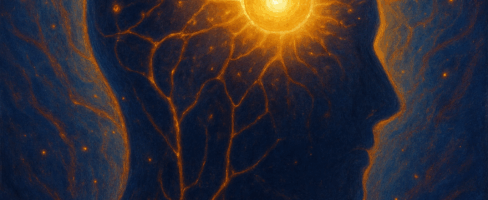
After my recent stint under general anesthesia I started thinking about the problem of consciousness again. General anesthesia is not like falling asleep. It’s one second your counting and the next second you are waking up in a recovery room. How it differs is that there is no subjective experience. There is no experience of it at all! You can’t say it’s dark, or its like floating because it’s not, it’s nothingness.
From a brain science viewpoint, general anesthesia is fascinating because it shows us how fragile consciousness really is. Anesthetics work by disrupting the communication between different brain regions – they basically disconnect the networks that create your unified conscious experience.
Think of your brain like an orchestra. When you’re awake, different sections (visual, auditory, memory, etc.) are all playing together in synchronized harmony – that’s consciousness. Anesthesia is like having the conductor leave and cutting the communication between musicians. Each section might still be “playing” (your brainstem keeps your stomach working, your heart beating), but there’s no unified performance anymore.
But here’s the unsettling part: if consciousness can be turned off and on like this, what does that say about death? Some philosophers argue that what we call “you” is more like a pattern or process than a permanent thing. When you’re under anesthesia, that pattern is temporarily disrupted but not destroyed.
Others find this deeply troubling. If your consciousness can have these gaps, are you really the same continuous being, or are you more like a series of conscious moments with the illusion of continuity? When you wake up from anesthesia, are you the same person, or a new person with the previous person’s memories?
This connects to thought experiments like teleportation: if you could scan your brain, transmit the information, and reconstruct it elsewhere (destroying the original), would that be you or just a copy with your memories? Anesthesia suggests consciousness might be more fragile and discontinuous than we like to think.
If you think of who you are, as a person. You are not your body. Losing an arm or a leg wouldn’t change who you are. You could go blind or deaf, and still be you. In fact, you could be a brain in a jar and you would still be you.
And yet, you are changing all the time. That is the defining feature of our species. Its ability to change and adapt.
Who are you?
So who are you? This is a question I have thought about for years – since University really. My final photo project was called “Who are you?”. It started as a game my mother and I played. At the time she was very interested in consciousness and the brain. The game works like this, you ask someone “Who are you?” and when they answer you say, “Thank you. Who are you?” And it is supposed to elicit the things you use to define who you are. And you keep asking the question. For my project I asked 10 of my friends to answer that question 10 times and superimposed their answers on top of their portraits.
You might say, “I am the son of so and so, and the brother of so and so.” That would seem to indicate who identify who you are by familial relationships. Possibly you might also answer, “I am a teacher, I am an artist, I am a doctor.” Which would place emphasis on your career or calling. You may identify yourself by country, or race, or sexual orientation or by none of these. The idea is you keep asking these questions until you get to the fundamental elements of self.
I wish I had written down my own answers from back then (30+ years ago) just to see how my self has changed.
So, who are you?



Immediately Morisette’s song, ‘I’m a B, I’m a lover; I’m a child,… comes to mind. I do not think I’m the person in the mirror. Or the role player in my home, work, and community. I’m a child of the stars, a steward of the land, a witness to love, hate, death and growth. And a servant to my cat.